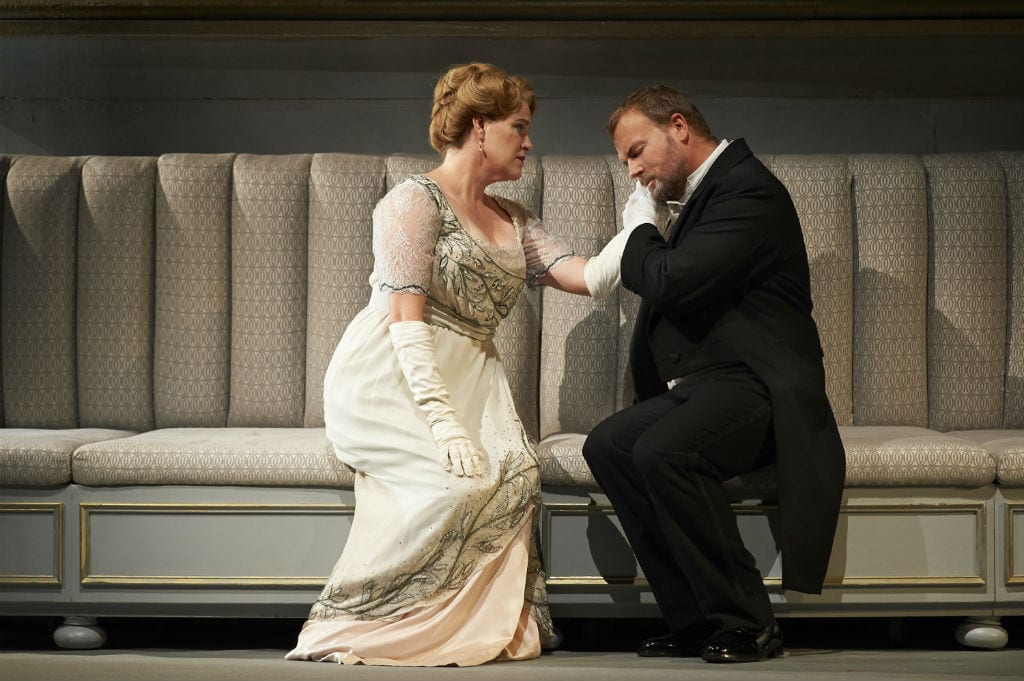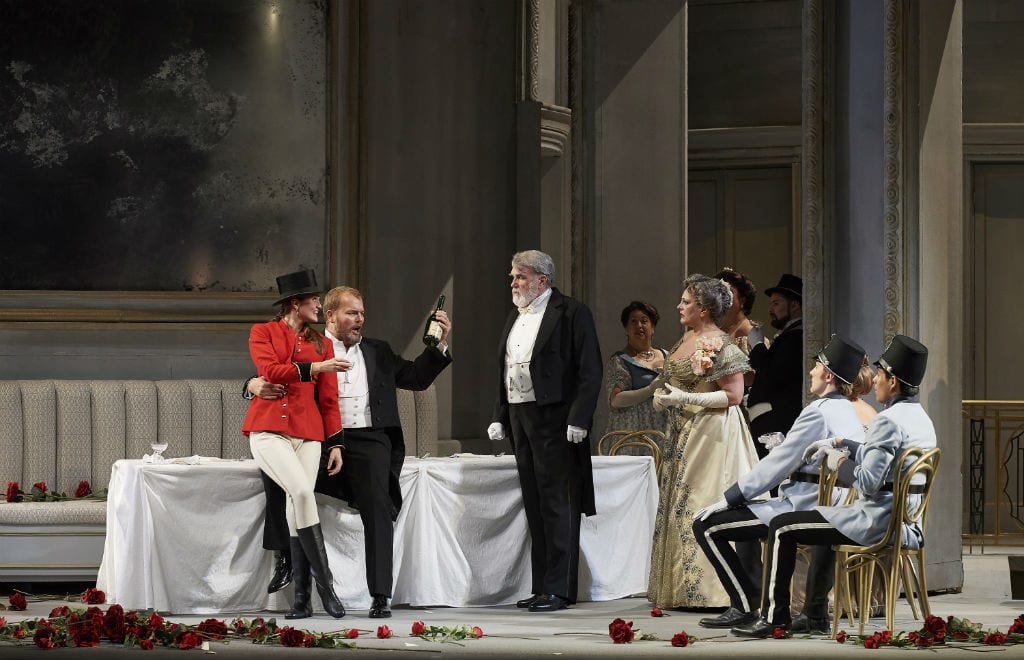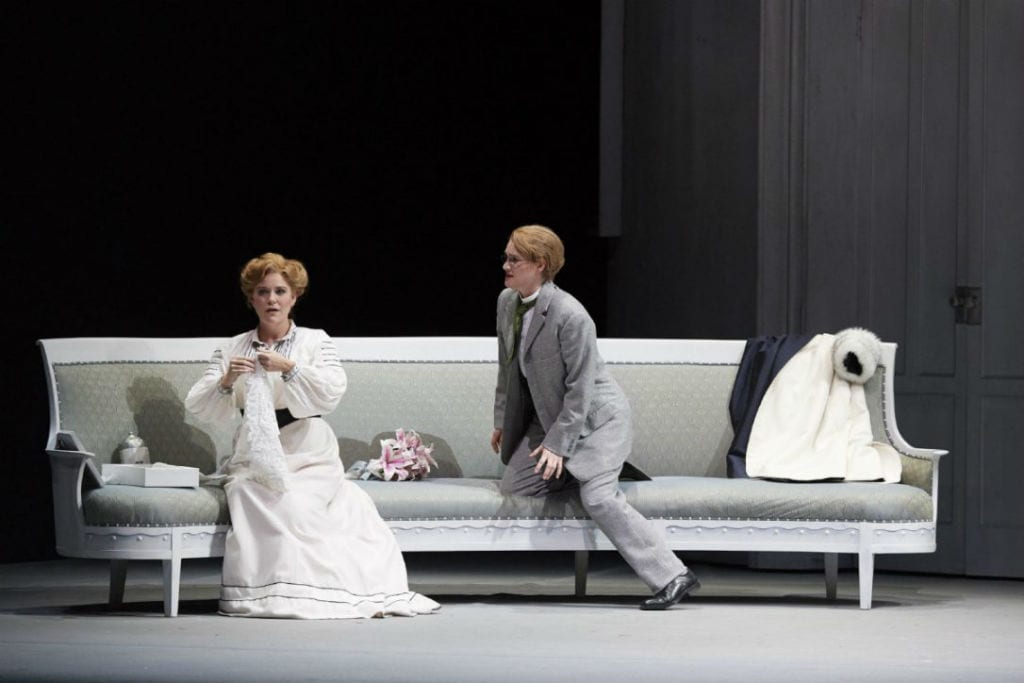The COC begins its 2017 season with a magnificent premier of Richard Strauss’s well beloved Arabella. With lush orchestral work, exceptional vocal talent on stage, and discreet production choices that foreground the opera’s thematics and music, this is an event not to be missed!
Originally set in 1860, Tim Albery chooses to recontextualize Arabella in the 1930s, in the wake of the Great War. The austere, rotating set by Tobias Hoheisel, in silver and gray, invokes the faded elegance of a place frequented by high society, while simultaneously creating a claustrophobic sense of a jail that allows no natural light to penetrate. These sober walls stare down the folly of youthful desire or ancient greed with chilling impassivity; the cold discomfort of such a place suggesting that transience is the only constant for the revolving string of seedy characters who may, in their desperate attempts to stay afloat in an economically precarious world, occasionally stumble upon a simple truth in the midst of all the complicated deceptions they enact.
Arabella is about sexual politics; about the agency, or lack thereof, with which a woman may lay claim to her body and sense of self. The opening scenes introduce us to a world where every character is engaged in an elaborate charade in order to acquire something, be it money, sex, power, or even love. Arabella herself is little more than chattel, following a pretense of choosing a suitor for herself, when in reality all she is doing is preparing to sell herself to the highest bidder who can pay off her father’s gambling debts; it is a role that rests heavily on her seemingly carefree shoulders. Erin Wall’s performance as Arabella tonight was magisterial to say the least. Her voice occasionally recalls a young Flagstad, and her dramatic presence on stage was as a luminous torch in an otherwise fading world.
In the role of Arabella’s sister, Zdenka, is a major Canadian talent–Jane Archibald. Zdenka is forced to live as a boy because her parents cannot afford to bring out two daughters in the same season. This willed gender subversion leads to the comically catastrophic events that occur when Zdenka finally lays claim to her sexuality and identity in the opera’s final act. Archibald’s capacity to deliver tortured young heroines, which shone so exceptionally in her recent performance as Ginevra in Ariodante (2016), was in full force tonight as she stumbled from one impossible decision to the next in her quest to lay claim to her body, her desire, and her self.
Set against the moral corruption and decay of Vienna, is the young Mandryka, and all he represents. Portrayed as a diamond in the rough, Mandryka is a character who is supposed to invoke an almost sentimental vision of Austrian manhood, with an incorruptible and somewhat childlike animus who promises the worldly Arabella a return to forests and streams, and a world untouched by the decay of urban putrefaction and greed. Tomasz Konieczny’s performance is intelligent in the extreme, while appearing both effortless and funny. Konieczny plays Mandryka as yet another cog in the paternalistic wheel that turns Arabella’s life. There is a brutality and ambivalence to him that the audience cannot fail to recognize, and yet he is able still to command our sympathy.
When the opera closes with Arabella bringing Mandryka a glass of pure, fresh water, a symbol that seems to suggest the washing away of the city’s subterfuge and deceptions, we want to believe as she does in a cleaner, clearer future. We also sense the shift in power, as she chooses her future and her partner on her own terms.
At a time when we collectively ponder the seemingly endless strain of abuse of power and manipulation of women’s agency and selfhood, this seemingly simple production of Strauss’s Arabella does ask some very interesting questions. One can only hope that more women find the capacity to will their choices, and mount their voices, on their own terms.
As Arabella chose Mandryka, and the final chords of the orchestra died away, the entire audience in the Four Seasons Centre for the Performing Arts leapt to its feet to give Erin Wall and Tomasz Konieczny a standing ovation. They stayed standing, and shouting, and applauding through six curtain calls — a sure sign that this production of Strauss’s Arabella is destined to go down in COC history as an all-time favorite.




